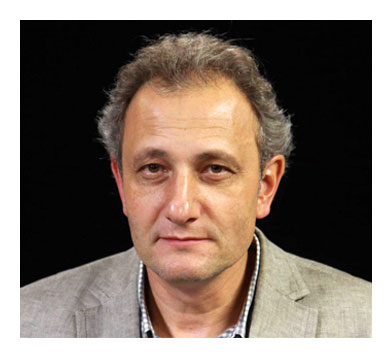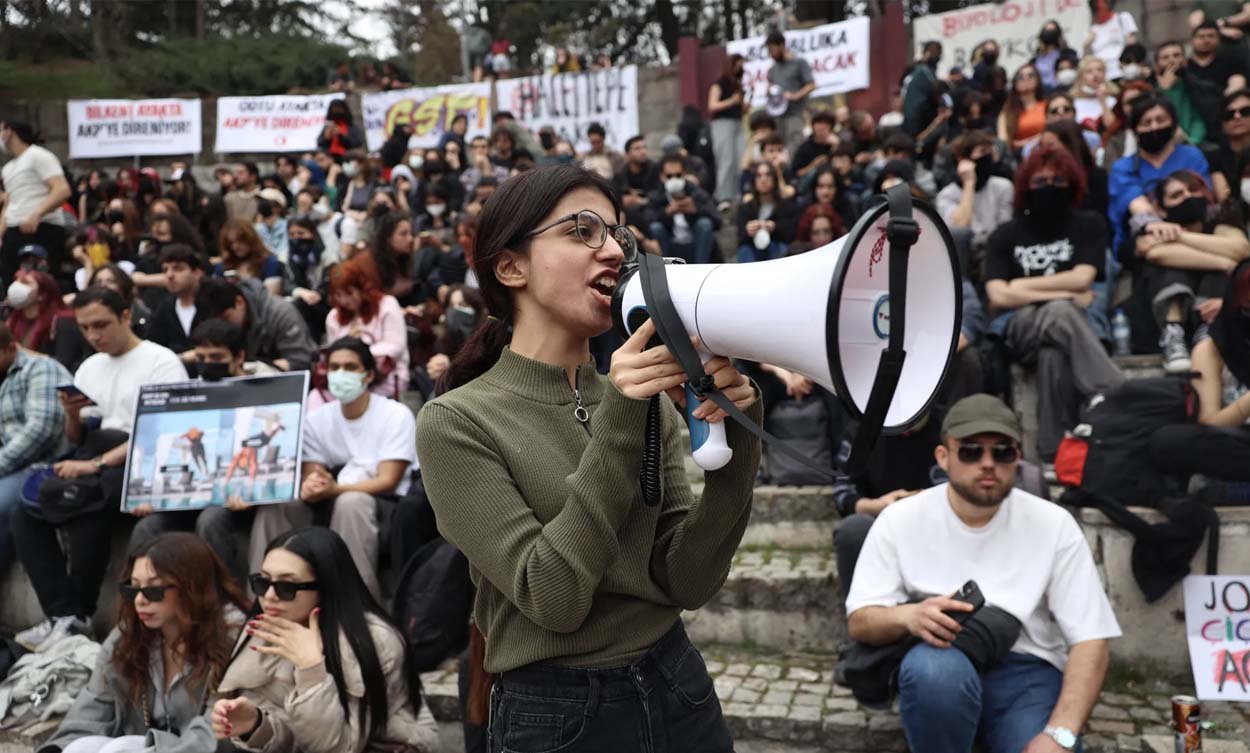 The images of protest are beautiful, they are inspiring and impressive. People stop being a crowd, they become a single organism, with a common understanding of what exactly they want and what outrages them. This organism has a brain and feelings. That is why autocrats and ordinary people of all times and nations do not believe that people can gather so consciously and with such a strong common emotion, and in such numbers, independently, without a puppeteer in a star-spangled cylinder or with a hooked nose and a kippah on the head. And without an understandable reason like the final of a football championship. Yet they gather. And times suddenly rhyme—a girl on Boulevard Saint-Michel sticking her tongue out at the orderly rows of police in May 1968, and a girl in Ankara, a student with glasses, explaining something into a megaphone in March 2025. Sometimes all this elusive beauty of peaceful protest ends tragically. We know this well, after 2011–2012, after 2021. In Turkey, almost 2,000 protesters have been detained, many of whom face serious real terms. The autocrat fights for power seriously.
The images of protest are beautiful, they are inspiring and impressive. People stop being a crowd, they become a single organism, with a common understanding of what exactly they want and what outrages them. This organism has a brain and feelings. That is why autocrats and ordinary people of all times and nations do not believe that people can gather so consciously and with such a strong common emotion, and in such numbers, independently, without a puppeteer in a star-spangled cylinder or with a hooked nose and a kippah on the head. And without an understandable reason like the final of a football championship. Yet they gather. And times suddenly rhyme—a girl on Boulevard Saint-Michel sticking her tongue out at the orderly rows of police in May 1968, and a girl in Ankara, a student with glasses, explaining something into a megaphone in March 2025. Sometimes all this elusive beauty of peaceful protest ends tragically. We know this well, after 2011–2012, after 2021. In Turkey, almost 2,000 protesters have been detained, many of whom face serious real terms. The autocrat fights for power seriously.
Belgrade, Tbilisi, Tel Aviv, Istanbul, once Minsk, Moscow, Saint Petersburg, Caracas, Tehran... Once upon a time—the Arab Spring. As a rule, protesters, especially peaceful ones, especially educated or receiving education (the Serbian protest is primarily student-based, university-based), come up with witty and precise slogans and demands. As a rule, they carry the flags of their country and paint the colors of these flags on themselves, as in stadiums during matches.

Students during a rally in support of the mayor of Istanbul in Seğmenler Park in Ankara. March 28, 2025. Photo: Adem Altan / AFP / Scanpix / LETA
Because it is their country, not those who stand on the other side of the barricades with tear gas and weapons. On the other side of the barricades, people in uniform also think it is their country. And the country of those they so zealously defend from their own fellow citizens. Fellow citizens whom they begin to consider strangers, enemies, deserving the most brutal treatment—this is war, civil war. And no one comes out to the heated protesters with admonitions and conversations, as the queen and king of Spain recently did during a natural disaster. This is not Spain, although it would seem that many of the countries where protests are taking place have approached a state of political democracy.
It turns out, no. And it is precisely against this that they protest. Against archaism, for modernity. Against the cancellation of modernization, against the movement towards "order" and "traditional values". Which, in turn, actually lead to disorder and arbitrariness; and traditional values, if they exist at all, have nothing to do with it, they always mean the restriction of human and civil rights and freedoms. These are protests against prohibitions on living normally. In situations where this normal life was already within arm's reach. And the authorities, realizing that normality threatened their rule, canceled and banned this life. And so people, true citizens, come out with the flags of their country, meaning the very thing that seemed indisputable in Russia more than ten years ago: "we are the power here".
Yes, there was a period when it seemed that hierarchies looked outdated, inevitably replaced by horizontal connections, communities of citizens, distributed, people-friendly power, where they really are the power themselves. Rigid, with furrowed brows, bristling with police batons, proud of its only freedom—the freedom of arbitrariness—such power is irreversibly going out of fashion. And peaceful protest, precisely peaceful, under the very flag of their country, can change everything.
Books have been written about all this. For example, Moisés Naím wrote a work with the characteristic title "The End of Power" (2013): numerous "micro-powers" were outpacing the old hierarchical power in their development and often replacing it. It seemed that the classic theory of modernization had triumphed—Naím wrote with enthusiasm:
"...It is not surprising that the "Arab Spring" began in Tunisia, a North African state with the best economic indicators and the fastest transitions of the poor into the middle class..."
Partly it was so, but the middle class eventually got tired of its own demands for change and rights. Naím's statements, who once held the positions of Minister of Trade and Industry of Venezuela and Executive Director of the World Bank, today seem like a blissful liberal utopia:
"...Civil liberties, human rights, and economic transparency are increasingly valued, and there are more and more advocates, experts, supporters, and platforms for promoting these values. I am not claiming that coercion is now impossible: I just want to say that now it is more expensive and in the long term harder to maintain..."
It turned out that the power here is not "we," but "he" or "they," with their rigid hierarchy, unyielding bureaucracy, and ruthless enforcers. They are not at all going to reckon with the cost of coercion. Moreover, "micro-powers," all sorts of bloggers and public figures, can be put at the service of big power, and the middle class, desiring luxury goods, human rights, and democracy in its consumption, can be tamed and sedated.
Having experienced the shock of rallies and demonstrations, sometimes ruthlessly suppressing them or carefully waiting for a pause, autocracy strikes back—becoming even more rigid and brutal. And fundamentally uncompromising. Or simply ignoring the position of people who took to the streets because the support of power is the silent indifferent majority. And the minority does not deserve to be listened to, even if it floods all the squares and streets—mainly capitals. You are all, even though there are many of you, capital city trinkets. Troublemakers provoked by invisible forces from abroad. And the people, the true people, the foundation and support of power, either do not care, or they look with great suspicion and distrust at those who took to the square. What do they even want, they would live quietly and not stick out.
Protests often represent urban educated classes, not necessarily middle, if measured by income. The country turns out to be split into an advanced, modernized part of society, and an inert and often archaic one. Often mayors of large and/or capital cities, especially if there are still elements of democracy in the state, oppose the first persons of such states. Such were, for example, the same arrested mayor of Istanbul or the mayor of Warsaw. (Note, in Turkey, unlike in Russia, it is still possible for the head of a large city to be an opposition leader, while the autocrat-head of state feared competition in elections, which in Russian circumstances seems unimaginable.)
In short, dictators and their machine of violence have learned not only to suppress mass protest but also to ignore it. All theories, including those described by mathematical formulas (for example, in "Economic Origins of Dictatorship and Democracy" by Daron Acemoglu and James Robinson), are being dismantled. Today's autocrat possesses an incredible will to retain power at any cost and fundamentally does not make any concessions. In their behavior, they approach the totalitarian leaders of the past, being ready, unlike "dictators of deception" (Sergei Guriev, Daniel Treisman), to use force and shed blood. Stretching their rule to infinity, new stable dictators experience legitimacy dystrophy. But the less legitimacy and legality, the harsher they treat those who take to the square, proving that "we are the power here".
The democratic order is experiencing difficulties, the voter loses stable preferences, elections from round to round shake the preferences of the ordinary person, who is dissatisfied with traditional parties, and he swings from the far-right flank to the far-left. A crisis of representation and trust arises. Essentially, this is a double distrust of the ordinary person—to the officialdom and to those who take to the streets to defend the principles of freedom; that is why he prefers Le Pen or "Alternative for Germany." And then comes Trump, who does not fit into any theories, and begins to finish off the world order, its values, and rules, their once seemingly unshakable and attractive universalism. Even Uncle Sam himself, wiping sweat from under the star-spangled cylinder, bewilderedly observes what is happening and nervously smokes in the corridor, no longer understanding his current role. It seems he is hopelessly outdated...
Protests in support of Ekrem İmamoğlu and democracy continue. This is not just a local Turkish plot—it reflects the global situation and creates a precedent: will the autocrat emerge victorious again, will the protest activity fizzle out, and everything will go on as before, or has Recep Erdogan, who, according to Özgür Özel, leader of the Republican People's Party, committed a coup, created long-term problems for himself? Has he created a crisis with his own hands that could have been avoided? So unsure of himself that he allowed for a future defeat in the elections? All the autocrats of the world are watching the experience of their colleagues, worrying and learning lessons.
So who is in power here?
*Andrey Kolesnikov is considered a "foreign agent" by the Ministry of Justice of the Russian Federation.